| Listing 1 - 10 of 368 | << page >> |
Sort by
|
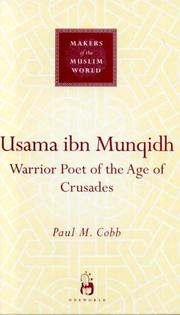
ISBN: 1851684034 9781851684038 Year: 2005 Publisher: Oxford: Oneworld,
Abstract | Keywords | Export | Availability | Bookmark
 Loading...
Loading...Choose an application
- Reference Manager
- EndNote
- RefWorks (Direct export to RefWorks)
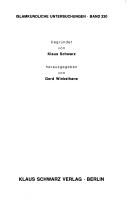
ISBN: 3879972826 3112401646 Year: 2000 Publisher: Berlin : Klaus Schwarz Verlag,
Abstract | Keywords | Export | Availability | Bookmark
 Loading...
Loading...Choose an application
- Reference Manager
- EndNote
- RefWorks (Direct export to RefWorks)
Ethnology --- Usāmah ibn Munqidh, --- Syria --- History
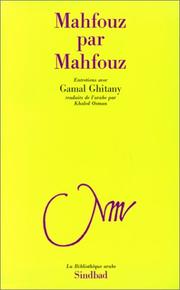
ISBN: 272740204X Year: 1991 Publisher: Paris : Sindbad,
Abstract | Keywords | Export | Availability | Bookmark
 Loading...
Loading...Choose an application
- Reference Manager
- EndNote
- RefWorks (Direct export to RefWorks)
Authors, Egyptian --- Biography --- Interviews --- Mahfuz, Najib, --- Maḥfūẓ, Najīb,
Book
ISBN: 9004406247 6002030492 Year: 2019 Publisher: Leiden; Boston : BRILL,
Abstract | Keywords | Export | Availability | Bookmark
 Loading...
Loading...Choose an application
- Reference Manager
- EndNote
- RefWorks (Direct export to RefWorks)
In Persian literary history, Firdawsī's (d. 411/1020) Shāh-nāma , the famous masnavi composed in celebration of the history of the kings and dynasties of Persia, is the archetypal epic poem. After the Shāh-nāma , many other epic poems saw the light, among them Asadī Ṭūsī's Garshāsp-nāma (dated 458/1066) and Īrānshāh b. Abi ʼl-Khayr's Bahman-nāma (dated 501/1107-08), but also Shīʿī adaptations celebrating the wondrous exploits of ʿAlī b. Abī Ṭālib and the beginnings of Shīʿism, such as Rabīʿ's ʿAlī-nāma (dated 482/1089) or Ibn Ḥusām's Khawarān-nāma (completed in 830/1427). The present masnavi is an example of an epic poem in the form of a romance, turning around the love of Sām, the grandfather of Rustam, for the daughter of the emperor of China. Previously ascribed to the 8th/14th-century poet Khwāju-yi Kirmānī, it has now been established that it is a product of later Persian folklore, blending parts of Kirmānī's Humāy u Humāyūn with elements from other tales and romances.
Persian poetry --- Khvājū-yi Kirmānī, Maḥmūd ibn ʻAlī,
Book
ISBN: 9004425330 9004425241 Year: 2020 Publisher: Leiden ; Boston : Brill,
Abstract | Keywords | Export | Availability | Bookmark
 Loading...
Loading...Choose an application
- Reference Manager
- EndNote
- RefWorks (Direct export to RefWorks)
The Horizons of Being explores the teachings of Ibn al-ʿArabī by examining Dāwūd al-Qayṣarī’s (d. 1350) Prolegomena ( muqaddima ) to his commentary, Maṭlaʿ khuṣūṣ al-kilam fī maʿānī Fuṣūṣ al-ḥikam (A Preamble of Select Discourse on the Meanings of the Fuṣūṣ al-ḥikam), referred to simply as Muqaddimat al-Qayṣarī. While his commentary represents the third in a direct line going back to Ibn al-ʿArabī through Kāshānī, Jandī and Qūnawī, it remains one of the most popular due to its thorough and accessible treatment of the Fuṣūṣ that frequently synthesizes the ideas of his predecessors. The Muqaddima stands on its own as an independent work and has been the subject of careful study. If the al-Futūḥāt al-makkiyya contains the entirety of Ibn al-ʿArabī’s metaphysics which is distilled in the Fuṣūṣ, then Qayṣarī’s Muqaddima can be read not just as a precis of the Fuṣūṣ but a summary of Ibn al-ʿArabī’s doctrine.
Sufism --- Ibn al-ʻArabī, --- Qayṣarī, Dāwūd ibn Maḥmūd,
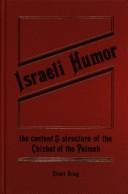
ISBN: 1438415176 0585088365 9780585088365 9781438415178 0873955129 9780873955126 0873955137 9780873955133 9781438415178 Year: 1981 Publisher: Albany : State University of New York Press,
Abstract | Keywords | Export | Availability | Bookmark
 Loading...
Loading...Choose an application
- Reference Manager
- EndNote
- RefWorks (Direct export to RefWorks)
Derived from the Arabic word for "lie," the word "chizbat" was chosen by members of the Palmah to designate the particular form of narrative joke exchanged by these volunteer defenders of Jewish settlements in Israel during the uncertain years 1941-48. Elliott Oring concentrates his attention on how the chizbat represents the expression of a distinctly Israeli identity and the disparate elements of this identity: sabra/European, Arab/Israeli, East/West. He shows how chizbat humor depends, not so much on novelty or punch line, as on displaying these incongruities of Israeli identity. Oring also discusses the sociocultural context in which the chizbat developed and examines how various theories of humor apply to understanding the chizbat. In an appendix invaluable for the folklorist, Oring has translated hundreds of chizbat into English. some are from written sources and others are verbal accounts he obtained during his months of research in Israel.
Israeli wit and humor --- Hebrew wit and humor --- Jewish wit and humor --- History and criticism. --- Palmaḥ --- Palmach --- Peluggot maḥaẓ --- Pelugot maḥats --- Israel. --- פלמ״ח --- Humor. --- Palma --- Palmah
Book
ISBN: 0198231814 Year: 1973 Publisher: Oxford Clarendon
Abstract | Keywords | Export | Availability | Bookmark
 Loading...
Loading...Choose an application
- Reference Manager
- EndNote
- RefWorks (Direct export to RefWorks)
297 <62> --- Shadhiliyah --- Shadhili Sufi Order --- Shadhiliyya --- Sufism --- Islam. Mohammedanisme--?<62> --- Shādhilīyah. --- Shādhilīyah. --- Rāḍī, Salāmah, --- Shādhilīyah --- Sofism --- Rāḍī, Salāmah, --- Salāmah al-Rāḍī, --- Salāmah ibn Ḥasan al-Rāḍī al-Shādhilī, --- Shādhilī, Salāmah ibn Ḥasan al-Rāḍī, --- راضي، سلامة --- Sociologie van de godsdienst --- anno 1960-1969 --- Egypte --- Sociology of religion --- Egypt --- Mysticism --- Islam
Book
ISBN: 1925377024 1925377032 192537744X 9781925377033 9781925377446 Year: 2016 Publisher: Clayton, Victoria : Monash University Publishing,
Abstract | Keywords | Export | Availability | Bookmark
 Loading...
Loading...Choose an application
- Reference Manager
- EndNote
- RefWorks (Direct export to RefWorks)
Women --- Women's rights --- Sex discrimination against women --- Women in Islam. --- Social conditions --- Maḥbūb, Maryam --- Criticism and interpretation.
Book
ISBN: 9781607240907 1607240904 1463216939 Year: 2009 Publisher: Piscataway, NJ : [Istanbul] : Gorgias Press ; Isis Press,
Abstract | Keywords | Export | Availability | Bookmark
 Loading...
Loading...Choose an application
- Reference Manager
- EndNote
- RefWorks (Direct export to RefWorks)
Turkish literature --- Turkic literature --- History and criticism. --- Maḥmūd Kāshgarī, --- Evliya Çelebi, --- Criticism and interpretation.
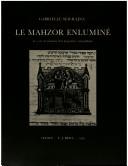
ISBN: 9004070672 9004670793 Year: 1983 Publisher: Leiden E.J. Brill
Abstract | Keywords | Export | Availability | Bookmark
 Loading...
Loading...Choose an application
- Reference Manager
- EndNote
- RefWorks (Direct export to RefWorks)
| Listing 1 - 10 of 368 | << page >> |
Sort by
|

 Search
Search Feedback
Feedback About UniCat
About UniCat  Help
Help News
News